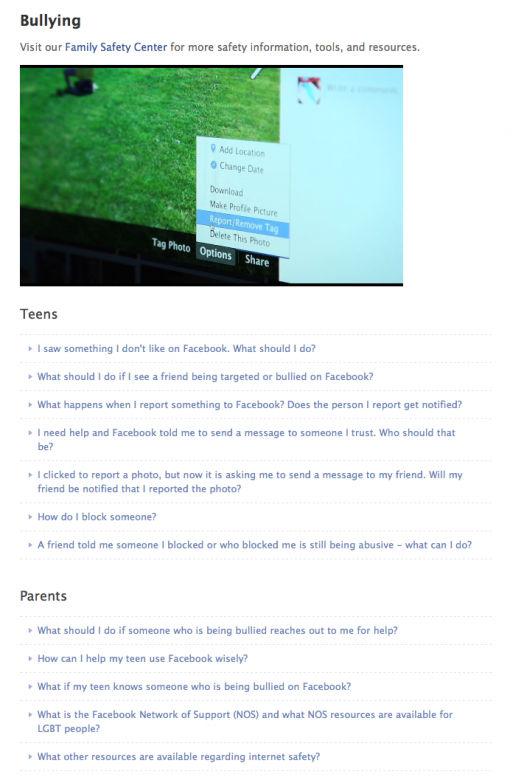So, as I’m in full holiday mode with all the shopping and parties…WHOOOMP! My kid decides he would like to be on Facebook.
It’s funny, this whole social media thing. I mean, I’m on it all the time for work. I post about my latest stories and funny stuff but now that my kid wants on…. WOW. My heart has quieted.
He’s watched from the side lines on how I use social media as a way to connect with friends and colleagues. He hears me talk about the various forms of social media and I let him see what I’m doing (er…sometimes). He’s been hesitant to go on but now that his friends are on he’s had a bit of an egging-on. It’s a little exciting and scary at the same time. That’s how it should be. I can only give him advice and guidance but it’s his space and I will respect that.
There’s so much I want to tell him but I don’t want to overwhelm him. But above all, I want him to understand that Facebook, like any other form of social media, still requires respect of other people’s privacy. One of the best pieces of advice I have heard is “don’t post anything you wouldn’t say in front of that person’s face or in public.”
But what happens if you feel like you’re getting bullied on Facebook? You can report it. You may be interested in knowing that there are different levels of online bullying. As a parent we often think of the worse. But we need to determine the level of bullying and discuss this with our kids. Is it a photo that’s not so flattering of you that’s posted? Did someone say something mean? Is someone threatening you? The tools are there to hopefully help resolve the issues.
Facebook has designed a way to gauge the level of abusive activity on a level that teens can relate with. It’s important for parents to point this feature out to the kids. The reality is our kids may not always come to us first for help but the site offers several resources to help them deal with varying situations.
Facebook recently conducted extensive research with leading researchers from institutions studying the science of emotion across dozens of languages and hundreds of culture, all with different values, social cues and definitions of respectful behaviour. Facebook held their fourth annual Compassion Research Day on December 5th that brought the experts together to discuss human interaction. After all, conflict and other challenges in relationships are impossible to avoid both online and off.
 It’s worth checking out the Privacy pages and the Family Safety Centre on Facebook for your own knowledge. It’s also worth mentioning to your teens that there are tools for them if they ever feel that they need it. Actually, it’s good not just for them …but for us too. There’s a great video clip that explains it under their bullying page.
It’s worth checking out the Privacy pages and the Family Safety Centre on Facebook for your own knowledge. It’s also worth mentioning to your teens that there are tools for them if they ever feel that they need it. Actually, it’s good not just for them …but for us too. There’s a great video clip that explains it under their bullying page.
I have to admit that I was happy to see that most of his friends are doing it right. We quickly looked at some friends’ pages and it’s a relief to know that they are being responsible, so far. I just mentioned to him that if something doesn’t feel right that he can come to me and we can figure out what to do. Together.
TOP Six Key Findings from Compassion Research Day: (provided by Facebook)
1) With the Right Tools, People Create a More Respectful Environment
Facebook makes it easy for people to report things to us that they find abusive or otherwise violates our Community Standards. But what about the cases where no Community Standard is violated yet someone is upset? And what if the people involved in the dispute would benefit from open, respectful dialog to more meaningfully resolve their problems?
We’ve created social resolution tools that help people reach out to one another when a photo, status update, or other post embarrasses, annoys or offends them. We supply suggested messages and make it easier for people to have a productive conversation. For example, when a user communicates another user about a embarrassing photo they found embarassing, the photo is removed or a conversation is started about 85 percent of the time. Sixty five percent of the people contacted feel positive about the person sending the message; 25 percent feel neutral.
2) People Welcome Feedback…
As part of Facebook’s research into controversial posts, we’ve found that the people who created status updates and shared links that annoyed or offended others are generally happy to hear feedback. More than three in five people feel positive toward those who send them a message about a controversial post (63 percent); and a similar number say they’re satisfied about being asked to remove the post (62 percent).
3) …Because They Most Likely Didn’t Mean to Offend Anyone
In surveys with people who were asked to remove their controversial status update or shared link, only one in 10 reported that they intended to provoke others or “prove a point.” The vast majority felt the post would be interesting, funny, or important to share. When people who report something categorize their reason as “something else,” it could include anything from “not my political party” to “there’s a time and place for religion.”
2) When you offer the right tools, people will use them
Facebook’s social resolution tools are giving people the tools they need to reach out to others who post offensive status updates, or share links they object to. By applying the lessons we’ve learned from helping people communicate about embarrassing or annoying photos, we’ve seen a ten-fold increase in the likelihood that a person will send a message to someone posting status updates they don’t like. For shared links, we’ve seen a five-fold increase. When we started this work, given an empty message box only 20% of people would send a message asking for a piece of content to be taken down. Today we are facilitating 3.9 million conversations a week using these tools.
Today we are facilitating 3.9 million conversations a week using these tools.
5) Emoticons Give People Familiar Ways to Express Themselves
Charles Darwin was a pioneer in finding that nonverbal communication transcended geography and culture, helping people communicate a broader, more precise range of emotions. Using his research, Facebook partnered with Berkeley and leading animators to give people the ability to share one of the most simple, but important forms of nonverbal communication: the facial expression.
Together, we created versions of emoticons that people identified with impressive levels of accuracy, giving us a unique window into how people are conveying emotion around the world. For example, our Finch stickers emerged as particularly useful to Facebook users in much of South America and North Africa. Australia, the United States, Saudi Arabia, and the United Kingdom are among the countries that use emoticons to convey the most diverse set of emotions.
6) Approaching an Old Problem With New Tools
We’re investing resources in helping people stand up for each other when they see bullying behavior, both online and off, with Facebook’s new Bullying Prevention Hub and new contextual resources in the heart of the Facebook product. These tools are tailored to the unique needs of people who want to take action, whether it’s a bullying victim wondering what to do, an adult who needs help talking to their child, an educator who is looking for ways to prevent bullying, or even guidance to someone accused of bullying on what he or she has done and how he or she can do better.
About Facebook’s Compassion Research Team
A diverse Facebook team, in partnership with experts studying human interaction, developmental psychology, the science of emotion, and evolutionary theory work every day to help people using Facebook have more meaningful connections and resolve disputes.
Now my question to you…if you’re kid is on Facebook (or any other form of social media) do you “friend” them too to keep an eye on things?
This post is not sponsored, nor was I compensated for my time. All opinions expressed are my own.


Leave a Reply